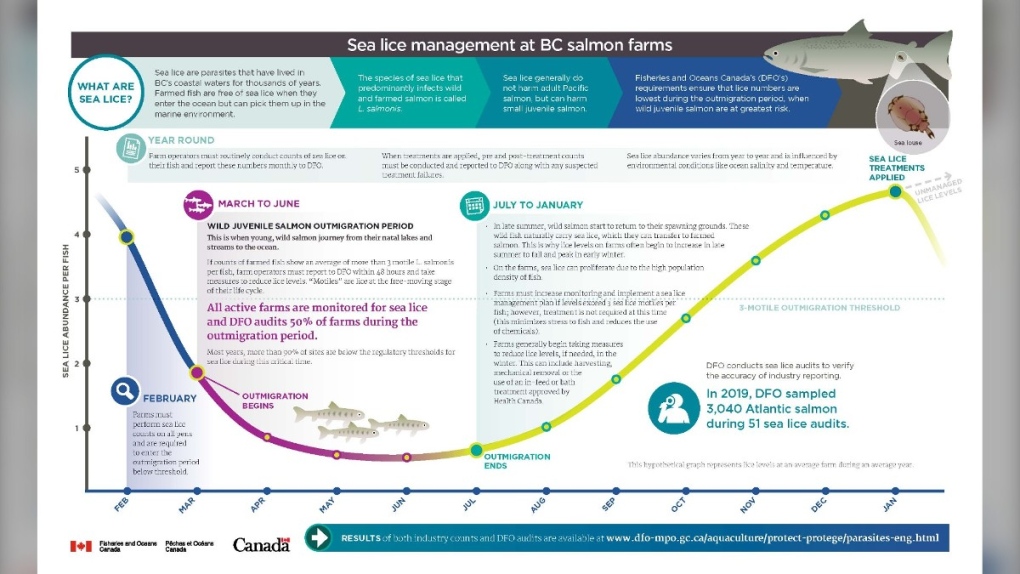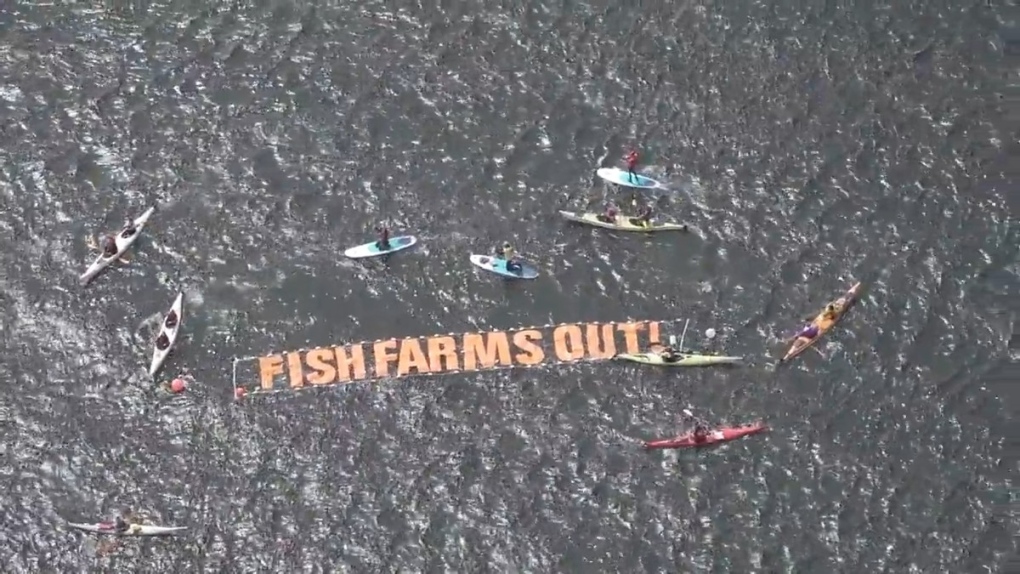
Lindholm scores the winner for Canucks in OT
Just over a minute into overtime, Elias Lindholm scored, bringing the Vancouver Canucks to victory over the Nashville Predators in Game 4.
Every spring, endangered juvenile wild salmon migrate from B.C.'s rivers to the Pacific Ocean, but their numbers are dwindling and some fear sea lice parasites are increasingly to blame.
Sea lice are tiny, oval shaped crustaceans that can cling to the backs of wild salmon, feeding on their skin, muscle tissue and blood.
Adult fish are generally not harmed when a few lice attach themselves, but juveniles with underdeveloped scales can be harmed or killed when heavily infested.
While the parasite occurs naturally in the waters off B.C.'s coast, there's long been concern over outbreaks on aquaculture farms where open-net pens make it possible for lice to move from farmed fish to young migrating salmon.
"Salmon farms act as this year-round reservoir for sea lice, potentially providing sea lice to wild juvenile salmon when they wouldn't normally get them," conservation biologist Sean Godwin said.
Godwin is the lead author in a recent study that looked at the state of sea lice in the Pacific Ocean. Along with his fellow researchers, he found the parasite is increasingly becoming resistant to one of the main tools the industry relies on to combat the problem.
"Our paper found that this tool, which is a pesticide known [as] SLICE, or emamectin benzoate, is becoming less effective and that sea lice are developing resistance to it on farms here," Godwin said.
To assess parasite resistance, "bioassay, treatment and salmon-louse count data from 2010 to 2021" were analyzed. During that time, the researchers found a notable decrease in the effectiveness of SLICE.
"It is going to be more difficult for salmon farms to control sea lice outbreaks on their farms," said Godwin.
In the province's stunning Clayoquot Sound, Bonny Glambeck routinely uses a fine-mesh net and a sample cup to test the waters near fish farms. Glambeck heads the Tofino-based conservation society known as Clayoquot Action and every year she monitors industry lice counts and tracks wild salmon infestations.
"The control of sea lice on fish farms is something I do not believe the industry has ever been able to crack," she said.
"Parasites like these sea lice proliferate on these farms and then they can pass them on to wild salmon. With that, we feel that every year that goes by and these farms are allowed to pollute the waters with these infestations, they are just wiping out another generation of wild salmon."
Fisheries and Oceans Canada requires all fish farms in Canadian coastal waters to have a sea lice management plan. The federal department also places a limit of three lice per salmon during the spring when young salmon are out-migrating and are most vulnerable.

In addition to that, the industry publicly reports lice counts on individual company websites every month.
"The worry is that those lice levels might accumulate and then be released back to affect wild migratory salmon. The science doesn't support that, but the concern exists so the industry responds to that," said Brian Kingzett.
Kingzett is the science and policy director with the BC Salmon Farmers Association. He says the industry has warned the federal government for years about the waning efficacy of SLICE, and has long called on Ottawa to approve new pesticide options.
"There are other anti-parasite agents that have been approved in other areas of the world and we would certainly like to add that to our toolbox."
While SLICE is the only approved pesticide in Canada, it is not the only option for a fish farm struggling with a lice infestation. Kingzett says other environmentally friendly methods include the use of specialized delousing boats.
One readily used vessel can suck fish from ocean-based pens into tanks where pressurized water is used to forcibly remove any attached lice. According to the industry, any dislodged bugs are collected by filters for disposal so they are not reintroduced to the marine environment.
"During the last five years, the industry has spent about $100 million on importing new technologies," Kingzett said. "Fish farming is an important industry in B.C. because we are facing a global seafood shortage and the farming sector is looking to provide sustainable, high-quality product."
The industry, however, is controversial and there's been an ongoing battle to have all fish farms in the province removed.
 Aerial footage submitted by Clayoquot Action shows protestors near a fish farm not far from Tofino, B.C. (Clayoquot Action)
Aerial footage submitted by Clayoquot Action shows protestors near a fish farm not far from Tofino, B.C. (Clayoquot Action)
Earlier this month, there was a large protest in Tofino involving Indigenous leaders, conservationists and environmentalists. The group took to the waters near a local fish farm to voice their opposition to the industry and call on Ottawa to evict them.
"It is a do-or-die moment for the salmon farming industry," said Alexandra Morton, who is an independent biologist and longtime wild salmon activist. "We need to do whatever we can to save wild salmon populations because they are sadly on the verge of extinction."
In response, those in support of fish farms argue they are not a direct threat to wild salmon and are a vital industry. According to the BC Salmon Farmers Association, there are nearly 5,000 jobs linked to fish farms and at least $1 billion "in economic activity" is generated annually.
Despite that, Ottawa has previously announced that it's committed to phasing out open-net salmon farms in B.C. by 2025. In addition, it's uncertain if 79 federal fish farm licenses expiring in June will be renewed.

Just over a minute into overtime, Elias Lindholm scored, bringing the Vancouver Canucks to victory over the Nashville Predators in Game 4.
Three women diagnosed with HIV after getting 'vampire facial' procedures at an unlicensed medical spa are believed to be the first documented cases of people contracting the virus through a cosmetic procedure using needles.
All 79 locations of pharmacy and retail chain London Drugs are shut down Sunday, and there is no estimate on when they will be back open.
One person was killed in a six-vehicle crash on Highway 400 in Innisfil Friday evening.
Ontario is introducing a suite of measures that will crack down on cellphone use and vaping in schools.
Australia's Prime Minister Anthony Albanese on Monday described domestic violence as a 'national crisis' after thousands rallied around the country against violence toward women.
Rookie goalie Arturs Silovs will start in net for the Vancouver Canucks when they face the Nashville Predators in Game 4 of their first-round playoff series Sunday.
U.S. intelligence officials have determined that Russian President Vladimir Putin likely didn't order the death of imprisoned opposition leader Alexei Navalny in February, according to an official familiar with the determination.
Tornadoes killed four people in Oklahoma and left thousands without power Sunday after a destructive outbreak of severe weather flattened buildings in the heart of one rural town and injured at least 100 people across the state.

The lawyer for a residential school survivor leading a proposed class-action defamation lawsuit against the Catholic Church over residential schools says the court action is a last resort.
Raneem, 10, lives with a neurological condition and liver disease and needs Cholbam, a medication, for a longer and healthier life.
As if a 4-0 Edmonton Oilers lead in Game 1 of their playoff series with the Los Angeles Kings wasn't good enough, what was announced at Rogers Place during the next TV timeout nearly blew the roof off the downtown arena.
Mounties in Nanaimo, B.C., say two late-night revellers are lucky their allegedly drunken antics weren't reported to police after security cameras captured the men trying to steal a heavy sign from a downtown business.
A property tax bill is perplexing a small townhouse community in Fergus, Ont.
When identical twin sisters Kim and Michelle Krezonoski were invited to compete against some of the world’s most elite female runners at last week’s Boston Marathon, they were in disbelief.
The giant stone statues guarding the Lions Gate Bridge have been dressed in custom Vancouver Canucks jerseys as the NHL playoffs get underway.
A local Oilers fan is hoping to see his team cut through the postseason, so he can cut his hair.
A family from Laval, Que. is looking for answers... and their father's body. He died on vacation in Cuba and authorities sent someone else's body back to Canada.